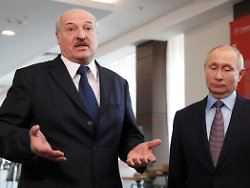Wednesday, December 1st, 2021
Minsk threatens the EU to stop gas
Lukashenko describes Crimea as Russian
Seven years ago Russia annexed the Ukrainian Crimea after a controversial vote. Belarusian President Lukashenko is now acknowledging Moscow’s power over the peninsula for the first time in an interview. A reaction from Kiev is not long in coming.
After a long hesitation, the authoritarian Belarusian ruler Alexander Lukashenko recognized the annexed Ukrainian Black Sea peninsula of Crimea as Russian for the first time. “The Crimea is (…) de facto a Russian Crimea,” said Lukashenko in an interview with the Russian state agency Ria Novosti, which was published in excerpts. “After the referendum, Crimea also became Russian by law,” said the 67-year-old, referring to a controversial referendum in 2014, after which Russia annexed Crimea against international protests.
In Moscow, Lukashenko’s words were taken as recognition of Crimea as Russian. Russian Foreign Minister Sergei Lavrov stressed that “nothing needs to be done and no laws have to be passed” for recognition. The Ukrainian Foreign Minister Dmytro Kuleba, on the other hand, said that Lukashenko’s actions mattered – and warned Minsk against official recognition.
The move is considered to be a sign of Lukashenko’s loyalty to Russian President Vladimir Putin, to whom he is in debt with billions. Only a handful of countries in the world recognize Crimea as Russian – including Nicaragua and Venezuela.
In the meantime, Lukashenko has announced tough countermeasures in the conflict with the West if further sanctions are imposed on Belarus. Once again he threatened to turn off the gas tap. Part of the important Russian-European pipeline Yamal-Europe runs through Belarus. However, only a small part of the gas is transported from Russia to Europe via the pipeline. Most of the flow through Ukraine and the Nord Stream 1 Baltic Sea pipeline. The Kremlin immediately stressed that gas supplies to Europe were secure.
Tensions between Belarus and the EU have intensified since the controversial presidential election last year. The West no longer recognizes Lukashenko as the rightful president and has imposed several sanctions for massive violations of human rights and for repression against those who think differently. The situation has recently come to a head because Lukashenko has been criticized for having flown in thousands of migrants from crisis regions and pushing them to the Polish border.
